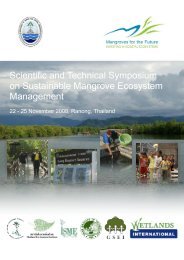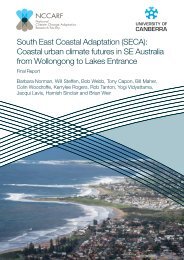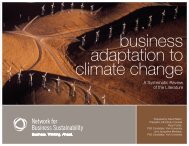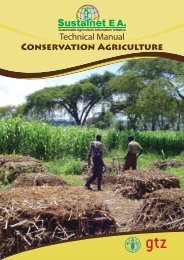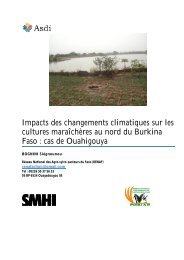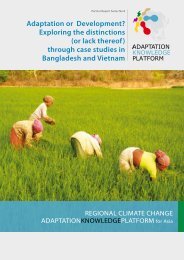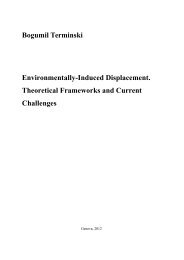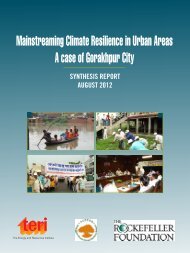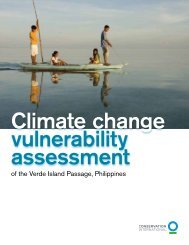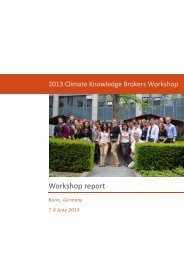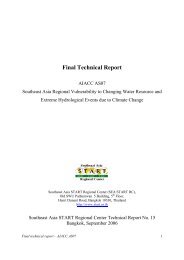existing Council’s water testing facilities, where people could take their soil, compost<strong>and</strong> water samples for comprehensive testing.It's a big a problem for us is the science....It's prohibitive. So testing for pesticides<strong>and</strong> stuff, what we usually do is I'll give a call to Bio<strong>security</strong> Queensl<strong>and</strong> or theGold Coast City Council or we might ring you guys [University] <strong>and</strong> say, ‘Is thereany possibility of you guys doing that for us? This is what we're doing,’ <strong>and</strong> weset that sort of situation up. If the health <strong>and</strong> safety of the population [is to beconsidered] which is the first point of call for us, then they have to have a rigoroustesting st<strong>and</strong>ard <strong>and</strong> they have to do that. So it's probably going to be more costeffectivefor them to employ someone in council that's qualified to do all of that,because the wastewater treatment guys already do a lot of this stuff anyway. Soit's probably going to be more cost-effective for them to just put someone in there<strong>and</strong> say, ‘That's the go to sort of person that will test the compost <strong>and</strong> test this<strong>and</strong> test that,’ <strong>and</strong> then it becomes a really streamlined, clean system as well[Micro farmer, Gold Coast].At the same time, it was suggested that research should be carried out on the bestways to remediate contaminated l<strong>and</strong>, <strong>and</strong> on what plants are safe to grow <strong>and</strong> eat,following different levels <strong>and</strong> types of contamination. Some individual gardenersreported that fruiting trees are much less likely to take up contaminants in the soil <strong>and</strong>pass them through to the edible parts of plants, than are leafy green vegetables.Consequently, a possible response would be to promote plants that do not take up soilcontaminants, recognising that such a promotional campaign would require expertscientific input on appropriate species from the outset. Furthermore, local governmentscould facilitate through grants, resource sharing <strong>and</strong> knowledge, the use of alternativegrowing mediums such as raised beds, planter boxes <strong>and</strong> straw bale systems.L<strong>and</strong> use invariably become a major talking point when <strong>urban</strong> agriculture wasdiscussed, because of the lack of l<strong>and</strong> available for <strong>urban</strong> agriculture, or the use ofpublic owned l<strong>and</strong> for community gardening, or because of potential nuisanceassociated with keeping animals. In terms of opposition to the further expansion ofcommunity gardening, the <strong>food</strong> forest model appeared to offer a potential way forward.The advantage of a <strong>food</strong> forest over traditional allotment-style community gardens isthat because they consist of trees, they do not prevent other activities, such as dogwalking<strong>and</strong> picnicking from taking place in the same vicinity. The model has yet to betested on any significant scale, although a proposal is currently being negotiated withDarebin Council in Melbourne to create a <strong>food</strong> forest in a section of All Nations Park.On the Gold Coast, numerous grassed, underutilized parks exist within the city, <strong>and</strong> aproportion of them could, in principle, be devoted to <strong>food</strong> forest experiments.As an alternative to the perceived lack of <strong>urban</strong> l<strong>and</strong> <strong>and</strong> the fear of losing public parksto <strong>food</strong> growing activities <strong>and</strong> enterprises, the innovative way in which Gold CoastPermaculture currently grows <strong>food</strong> <strong>and</strong> runs a successful micro-business – through thetemporary leasing of private l<strong>and</strong> offers a model for other <strong>urban</strong> <strong>food</strong> growers. In mostAustralian cities, many opportunities exist for non-permanent <strong>food</strong> productionenterprises to take over l<strong>and</strong> on a temporary basis:Developers are sitting on just thous<strong>and</strong>s of hectares of space everywhere aroundAustralia <strong>and</strong> there's really no reason why a lot of that l<strong>and</strong> can't be given over togroups to grow <strong>food</strong>. We could replicate this place half a dozen times down the<strong>Urban</strong> <strong>food</strong> <strong>security</strong>, <strong>urban</strong> <strong>resilience</strong> <strong>and</strong> <strong>climate</strong> <strong>change</strong> 145
coast without any problems whatsoever, if we just had some developers saying,‘Well, I've got 2,000 square metres here <strong>and</strong> I'm not going to do anything with itfor 12 months. Come <strong>and</strong> garden it.’ A; it's going to save them money to maintainit <strong>and</strong> B; people get a lot of benefit out of it. Space is there <strong>and</strong> even if it was onlyused for 12 months, it's still worth the time put in, to get in there <strong>and</strong> do thegardens [Micro farmer, Gold Coast].A proposed solution to facilitate the usage of private l<strong>and</strong>s on a mutually beneficialbasis is through the temporary donation of a piece of l<strong>and</strong> to a community organisation,something that Gold Coast permaculture is also starting to pursue:In order to start locking away some of this private l<strong>and</strong>, we are trying to aim forDGR [deductible gift recipient] status, so we can go to these corporations whoare not going to use these l<strong>and</strong>s for years, <strong>and</strong> we can say ‘how about you take atax break by donating that to us’ [Micro farmer, Gold Coast].Lastly, funding was always on the agenda of interviewees as a major barrier to thedevelopment <strong>and</strong> expansion of <strong>urban</strong> agriculture, in particular to the creation <strong>and</strong>management of community gardens. To reduce this financial burden on localgovernment, the approach taken by Gold Coast Permaculture is worthy of widerconsideration: in addition to community garden beds, micro-enterprises generateenough funds through the sale of vegetables, honey <strong>and</strong> compost to keep the wholesite solvent, without the need for subsidies from the Council.We are not reliant on the council so much. If we can get a grant, that's great. Itmeans, okay, we can buy this <strong>and</strong> that - we can buy some more hives. [But theimportant thing is that] we underst<strong>and</strong> that the council has to identify <strong>and</strong> cutcosts to put the budget in line, <strong>and</strong> we think that we can identify savings, inparticular through diverting waste streams, so that means that system can get up<strong>and</strong> running again [Micro farmer, Gold Coast].A major obstacle for many community gardens in Australia is that in most localgovernment areas community gardens are not allowed to sell any of their produce,which significantly impedes their economic viability <strong>and</strong> independence. A simplesolution would see Councils allowing community gardens to sell some of their producefor fund raising purposes.The other thing is that you cannot sell anything from community gardens so youare instantly keeping it on the tip, you know, so if you make them independentyou allow them to rent their space out, to rent their shed out to make 20 dollars.You don’t need much to run a community garden, make it ok for them to sell plantor excess produce. Simple! [Community gardener, Gold Coast].<strong>Urban</strong> <strong>food</strong> <strong>security</strong>, <strong>urban</strong> <strong>resilience</strong> <strong>and</strong> <strong>climate</strong> <strong>change</strong> 146
- Page 1 and 2:
Synthesis and Integrative ResearchF
- Page 3 and 4:
Published by the National Climate C
- Page 5 and 6:
ABSTRACTFood security is increasing
- Page 7 and 8:
1. a review of the literature: on n
- Page 9 and 10:
its Food for All project. This help
- Page 13 and 14:
In response to the existential thre
- Page 15 and 16:
2. OBJECTIVES OF THE RESEARCHFood i
- Page 17 and 18:
debates and to the more systematic
- Page 19 and 20:
organisation in the past few years.
- Page 21 and 22:
4. RESULTSIn this section we presen
- Page 23 and 24:
increasing productivity. Thus, whil
- Page 25 and 26:
people and the origins of their foo
- Page 27 and 28:
urban food supply chains. Thus, whi
- Page 29 and 30:
This logistics system is dominated
- Page 31 and 32:
Like Hodgson et al., as per definit
- Page 33 and 34:
esilient, powerful by being locally
- Page 35 and 36:
volume or even its contribution to
- Page 37:
community food growing can have on
- Page 40 and 41:
generations this history has been f
- Page 42 and 43:
a stronger focus on addressing the
- Page 44 and 45:
The third key aspect is fairness -
- Page 46 and 47:
climate (which we live and work in
- Page 48 and 49:
agriculture. Eight percent is in ur
- Page 50 and 51:
This concept of the ‘spaces in be
- Page 52 and 53:
esearch scientist and chair of the
- Page 54 and 55:
As discussed above, protection of t
- Page 56:
4.2.5 What is the extent and the im
- Page 60 and 61:
no place under the panoply of pract
- Page 62 and 63:
increased, the market dominance of
- Page 64 and 65:
… the residents of S Park called
- Page 66 and 67:
5. CONCLUSIONSThere is growing conc
- Page 68 and 69:
urban resilience. This inevitably c
- Page 70 and 71:
In many respects these contrasting
- Page 72 and 73:
Many interviewees of both standpoin
- Page 74 and 75:
a given area. The rationale for thi
- Page 76 and 77:
mapping the location of sources of
- Page 78 and 79:
Australian food policy debates refl
- Page 80 and 81:
APPENDIX 1: URBAN FOOD SECURITY, UR
- Page 82 and 83:
IntroductionGlobally, and in Austra
- Page 84 and 85:
Review methodsThis stage of the res
- Page 86 and 87:
despite many of the causes of food
- Page 88 and 89:
…by 2050… food production will
- Page 90 and 91:
2. How is food security (in general
- Page 92 and 93:
the food security of cities, but no
- Page 94 and 95:
While some see the density of devel
- Page 96 and 97:
when suppliers, distributors, and c
- Page 98 and 99:
a more prominent role in enhancing
- Page 100 and 101:
community gardens webpage on the Co
- Page 102 and 103:
comprehensive description of the ca
- Page 104 and 105: In both the developed and developin
- Page 106 and 107: Their review notes a significant in
- Page 108 and 109: lines of supply from often rural pl
- Page 110 and 111: 1 IntroductionCities have always be
- Page 112 and 113: Despite some attempts to curb urban
- Page 114 and 115: the Gold Coast remains a city that
- Page 116 and 117: ackyard/community gardenernot affil
- Page 118 and 119: level in local government. VicHealt
- Page 120: Figure 2: Impacts on Municipal Food
- Page 125 and 126: security I recognise that the cost
- Page 127 and 128: United States, he offered the follo
- Page 129 and 130: This vision highlights the multi-fu
- Page 131 and 132: An environmental education centre.
- Page 133 and 134: Melbourne Food ForestA Melbourne ga
- Page 135 and 136: stakeholder consultations, the repo
- Page 137 and 138: can. We sense the changes. The earl
- Page 139 and 140: half-desert environments. We’re g
- Page 141 and 142: etain its basic function and struct
- Page 143 and 144: government; and that trying to get
- Page 145 and 146: the north and the west, where it wo
- Page 147 and 148: Why do people buy so much food that
- Page 149 and 150: urban agriculture (however broadly
- Page 151 and 152: enefits and risks. Before we can co
- Page 153: Another important and tangible role
- Page 157 and 158: BIBLIOGRAPHYAECOM (2011) Scoping St
- Page 159 and 160: Burns, C. I., A. (2007). Measuring
- Page 161 and 162: Edwards, F., & Mercer, D. (2010). M
- Page 163 and 164: James, S. O’Neill, P. and Dimeski
- Page 165 and 166: Millar, R., 2012, ‘Government shi
- Page 167 and 168: Saltmarsh, N. M., J; Longhurst, N.
- Page 169 and 170: Walker B., 2008, Resilience Thinkin



